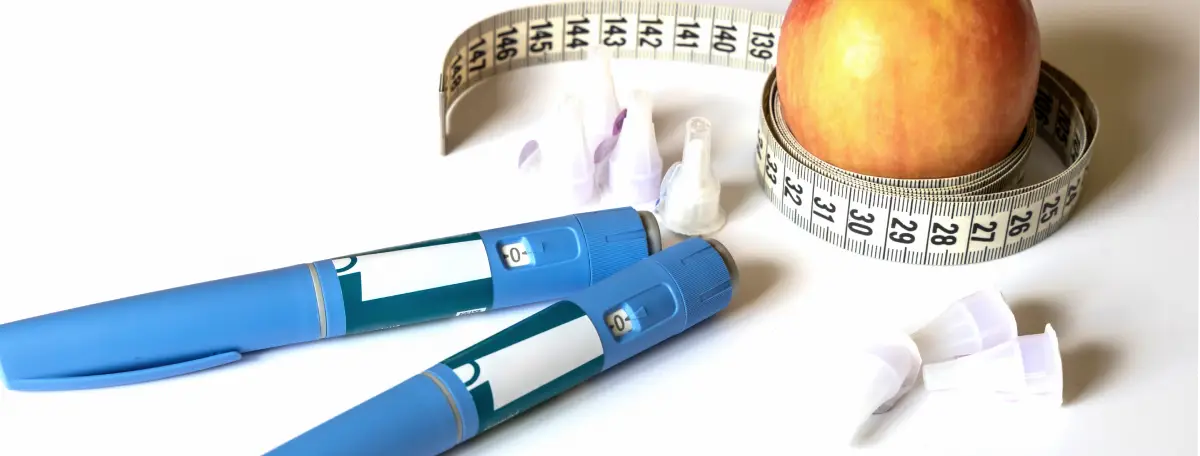We use cookies to help provide you with the best possible online experience.
By using this site, you agree that we may store and access cookies on your device. Cookie policy.
Cookie settings.
Functional Cookies
Functional Cookies are enabled by default at all times so that we can save your preferences for cookie settings and ensure site works and delivers best experience.
3rd Party Cookies
This website uses Google Analytics to collect anonymous information such as the number of visitors to the site, and the most popular pages.
Keeping this cookie enabled helps us to improve our website.

Weight Management Advice
Welcome to the clinic. We have prepared this advice document as part of the service offered by our weight loss clinic. This is not a replacement for the patient advice leaflet (PIL) or the instructions for use leaflet (IFU) provided by the manufacturer, both of which should be read carefully and completely.
Mounjaro and other injectable anti-obesity medications (AOMs) are effective weight loss drugs. They can be used in people who are obese and overweight, but their availability on NHS prescription is currently very limited, hence the high numbers of requests for private prescriptions. We have developed our clinic in the face of high patient demand for AOMs, and in order to safely prescribe these drugs within national guidelines, and as part of a holistic approach to weight loss. We have GPs with additional qualifications in lifestyle medicine who have helped to develop a service that adds extra benefit to medication alone.
It is important to recognise that:
- Weight loss is not just fat loss
- The injections produce only a temporary weight loss UNLESS a person changes their lifestyle.
Let’s look into this….
Weight loss is not just fat loss
AOMs can produce rapid weight loss. However, two studies have shown that 60% of weight lost on AOMs is fat, and 40% is lean mass (muscle). Lean mass is mainly muscle and bone. Lean mass loss will also occur with any other means of a rapid reduction in calorie intake, as in the 800 calorie diet for example. The more rapid the weight loss, the more muscle and bone lost.
AOMs will produce only temporary weight loss
The injections work during use. However, there will come the day when you need to stop using them (financial, side effects, prescribing restrictions). At that time, if you revert to the lifestyle factors which caused your obesity or overweight, then your weight will also revert to pre-treatment levels. In fact many of the trials of these medications show that most people do regain weight on stopping the medication. Worse, if you are inactive it is possible that you will not regain the lost muscle and bone, only the fat. This would not be a good outcome.
Recommendations for a holistic approach
These two key facts mean that AOMs are best used as part of a holistic approach to weight loss. This means a commitment to positive changes in your lifestyle in order to permanently tackle the root causes of your overweight or obesity problem. If your weight and health is important to you, then a critical look at your lifestyle is vital.
Let’s start with nutrition and exercise
The typical western diet is widely held to be the number one cause of overweight and obesity, alongside a lack of physical activity. This means a calorie dense diet with too much sugar, fat and salt, and too little fibre. Ultra-processed food (UPF) typically adds many chemicals which are harmful as they cause chronic inflammation which in turn leads to disease. 57% of the typical western diet is made up of UPF. Its addictive nature also worsens the chances of overweight or obesity.
Recommendation 1
Prioritise protein intake. Protein is essential for muscle growth and repair. A high protein diet can include lean meats, fish, eggs, legumes (beans). Also nuts and seeds which also provide vital micronutrients (trace elements and vitamins) as well as fibre.
Recommendation 2
Balanced nutrition. This includes plants, whole foods and healthy fats. This will supply essential nutrients and also fibre. Visit the NHS website for further information
Recommendation 3
Strength training to maintain and build muscle. Resistance training exercises 2 or 3 times a week as well as physical activity of at least 30 minutes per day. Resistance training can include weightlifting, body weight exercises, or the use of resistance band s. Start slowly and gradually build up. The NHS Fitness studio resources are a good place to start if you are a beginner to strength training.
Recommendation 4
Adequate hydration. This will optimise your physical and mental performance. It will also guard against the common AOM side effects of constipation and other gut symptoms. Aim for at least 6-8 cups/glasses of water each day. Try to cut out drinks with added sugar or sugar substitutes (UPF again). Limit fizzy drinks and alcohol. Also consider stopping caffeinated coffee and tea from early afternoon onwards. This will help your sleep pattern.
Recommendation 5
Consider supplements. Here the evidence is not so clear cut or consistent. Supplements recommended include Vitamin D and B12, calcium, omega 3 (fish oil) capsules and multivitamins.
Recommendation 6
Monitor your progress. Track weight loss, but also consider monitoring your body composition and strength. Be honest with yourself, particularly about lifestyle changes. Remember that it is these that will sustain your weight loss when you stop injections.
Recommendation 7
Rest and recovery, including getting enough sleep. Allow your body adequate time to recover after strength training and physical activity. Muscles grow and repair when you are at rest, not whilst you are working them.
This document is for information purposes only. If you have concerns about muscle loss or side effects, or need more detailed help then please contact our service or mention them during follow up.
